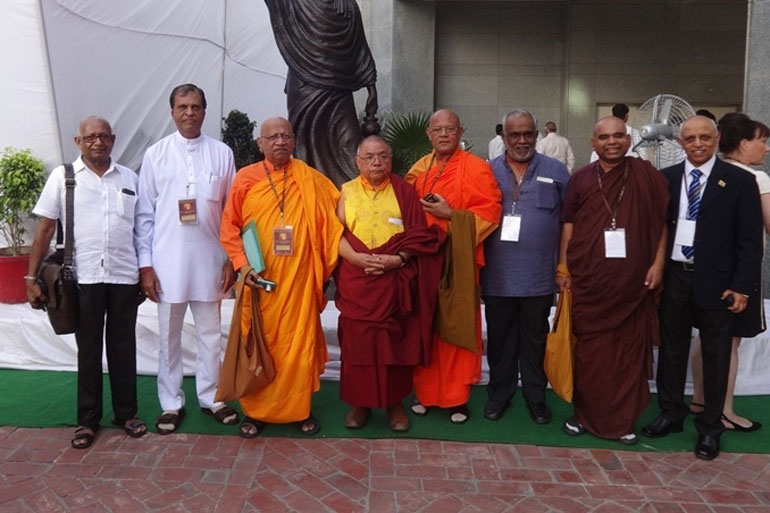Thursday Feb 19, 2026
Thursday Feb 19, 2026
Saturday, 12 September 2015 00:00 - - {{hitsCtrl.values.hits}}

A group of Buddhist monks and Hindu religious persons from several countries including Ven. Dr. Bellanvila Wimalarathana thero, Chairman of the Mahabodhi Society Ven. Banagala Upatissa thero, R.A.D. Sirisena Former Minister of Samurdhi, General Secretary Urumayaka Ulpatha Trust and K. Balasundaram CEO and Director of MMBL Pathfinder Group, representing the Urumayake Ulpatha Trust
The ‘Global Hindu-Buddhist Initiative on Conflict Avoidance and Environment Consciousness’ jointly organised by the Vivekananda International Foundation (VIF) in collaboration with the International Buddhist Confederation and Tokyo Foundation was held in the premises of VIF in New Delhi recently.
Indian Prime Minister Narendra Modi inaugurated the two-day conclave. Former Sri Lanka President Chandrika Kumaratunga, senior ministers from Japan, Myanmar, Bhutan and Nepal besides Sri Ravishankar and Lama Lobsang, the President of the International Buddhist Confederation were in attendance.
The conference seeks to evolve a new paradigm that speaks about ‘conflict avoidance’ rather than ‘conflict resolution’ in finding solutions to the world’s problems. For decades, the world has attempted to find peace by negotiating after conflicts have broken out. The organisers however believe that this approach is increasingly failing to deliver results. Therefore, in consonance with the ancient philosophies practiced by both Hinduism and Buddhism, it is now necessary to try and avoid conflicts rather than resolve them.
The Pathfinder Foundation and Vivekananda International Foundation had signed a Memorandum of Intent to cooperate on issues of bilateral interest in mid-2015 and agreed to establish strong civilisational links between India and Sri Lanka, and between the Hindu and Buddhist traditions. Not only will this add another welcome dimension to the multi-faceted relations between the two countries; it will also provide mutual support to each other in the face of global currents that could be inimical to their long-term stability.